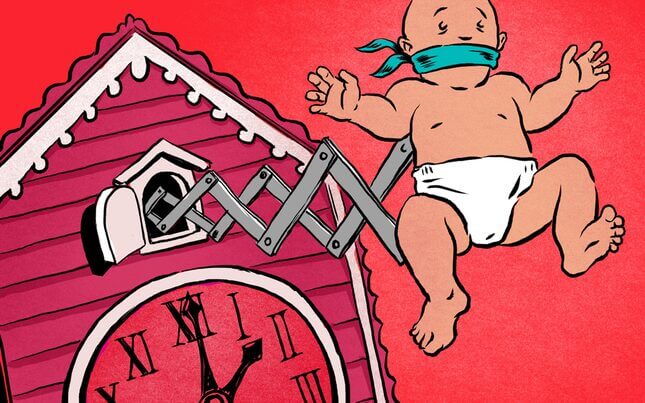Don't Listen to Assholes Who Tell You When to Have Kids
Latest

For the first time in seven years, the birth rate has risen. The 1 percent increase is attributed to women in their 30s and 40s popping ‘em out a smidge faster. But, before you begin to celebrate the expansion of motherhood’s age range, here are a bunch of statistics from a piece at Quartz that says that those older moms and dads are miserable—and that it’s high time they stopped pretending otherwise.
Emma-Kate Symons rounds up a slew of stats and some anecdotes that paint a bleak picture for the older parent. Symons reports that there are nine times more first-time moms over 35 than there were in the 1970s, and that men with at least a bachelors are also breeding later, with a “steady increase” in dudes aged 40 to 49 who have kids under 6 years old.
Symons writes:
But contrary to a vociferous faction of the 40-plus “happymommy” blogger crowd and out-of-touch child-raising manuals, it’s not going well at all.
Katrina Alcorn, author of the bestselling Maxed out: American Moms on the brink, says women who delayed having kids ‘‘to try to get a foothold in their careers or to get some financial stability’’ are being pushed beyond their limits as they struggle with work-life balance and the additional burdens that mid-life brings.
‘‘They find themselves in their 40s, sandwiched between raising young kids and trying to take care of aging parents while also trying to support their families financially,’’ she explains to Quartz.‘‘It’s too much.’’
While I personally believe that absolutely anything can be shitty at any time if you frame it correctly with your shitty brain, I also have to say: You know what could also be “too much”? Having a kid in your twenties and forgoing vital career advancement, only to meet the bias of resume gaps when you re-enter the workforce. Or, really, having a kid at all, if you’re a woman, because there’s a penalty for mothers (but not fathers!) for doing so—at any age. Other things that are too much: Having a kid at any other time than when you were personally ready for whatever reason because of statistics, or the suggestion that it might bring you less joy than some other person whose experience you will never know anyway.
Moving on, Symons adds an anecdote to round out these stats:
One Washington, DC-area working mom in her 40s (who asked not to be named) tells Quartz: ‘‘I feel like I am a parent to four small children not two, and I’m not sure cloning myself would even be enough.” She’s also caring for her sick mom and dad (who live in another state) and juggling an array of end-of-year parties, concerts and “graduations” for her preschoolers. At the same time, she is holding down a full-time job, like her husband, except hers demands regular travel.
The men in these high-powered couples are wilting under the pressure too.
She reels off another set of stats, too, about how older parents are less likely to have the “common sources of support” for childrearing, like family, neighbors, friends, etc. And how parents are apparently most exhausted with a child under 7 years of age. And:
-

-

-

-

-

-

-

-

-

-

-

-

-

-

-

-

-

-

-

-

-

-

-

-

-

-

-

-

-

-

-

-

-

-

-

-

-

-

-

-








































